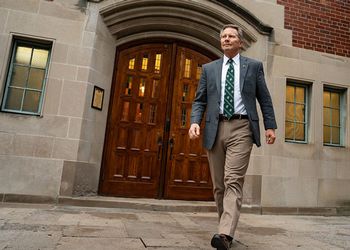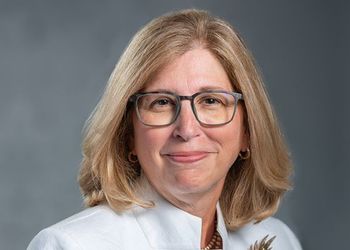Feature: MSUAA Career Services Gives Members an Occupational Edge

Alumni career services have been ramped up, a timely bonus to help many weather the economic downturn that has uniquely impacted Michigan.
Robin Miner-Swartz, ’93, wanted to be a newspaper writer since age 11. Her dream job is the one she currently has as features writer and editor at the Lansing State Journal.
In recent months, she notes, “I saw the newspaper industry crumble around me, and saw people lose their jobs in a blink.”
When she was furloughed a couple of times earlier this year, she decided to be proactive and take charge of her future path. She took some seminars and webinars on social media, and then one day, in April, she attended a career presentation at MSU’s College of Communication Arts & Sciences. The speaker was John Hill, executive director of MSU alumni career services.
Hill spoke about a number of topics related to job search—something that he has done at alumni meetings around the country, some 200 times in the past year, often to overflow crowds. It’s part of Hill’s goal to help the alumni association engage alumni. Hill focuses on the power of Linked-In, an online networking site with some 100,000 Spartans participating. Some 15,000 of them, including both employers and job-seekers, are a part of the MSU Alumni Association network—the largest Spartan group in Linked-In. Robin says she was “energized” by Hill’s enthusiasm and joined this group. While exploring the site, she found David Isbell, coordinator of alumni career services, who holds a joint appointment between the MSUAA and MSU Career Services.
Isbell’s profile reads, “I help adults to figure out what they do best and then how to communicate that to people who will pay them for it.”
Robin promptly contacted Isbell and set up an appointment. Eventually, a few meetings later, Robin had completely reinvented herself to position herself in the job market should the need ever arise.
“The sessions with Dave were really thought-provoking,” says Robin. “He had me do a series of very revealing exercises. I always thought of myself as a journalist, but that was very limiting. He had me take an objective look at my skills and assets, get a much clearer picture of myself, broaden my outlook, and construct my dream job.
“Before working with Dave, I was completely unprepared. I hadn’t written a resume in 15 years. After this process, I feel reinvigorated about my current job, but if that were to end, I feel that I’m very well prepared to present myself as I re-enter the job market.”
Robin says she has learned how to network and how to market herself. “My old resume was dull,” she says. “In my new resume, I introduce myself as someone who is passionate about affecting change via social media. I am completely sold on what the MSU Alumni Association provides as far as career services, and I’ve told all my friends that that alone is worth the membership dues.”
Robin is not alone in her enthusiasm for the MSUAA’s alumni career services. Many others, some of them profiled below, benefited from the advice they received—including Emily Kaminski, ’02, of Kentwood, who landed a job in November as an admissions representative for Davenport University, Grand Rapids, after heeding advice from Isbell. “We had a 45-minute conversation on the phone,” she recalls. “He brought up at least three things I hadn’t thought of that were very helpful.” Isbell advised Kaminski to seek a certification process, to tell people how her skills could help them, and to work at networking, especially through the use of social media. All came in handy. When she applied for her current job, a half dozen network friends sent recommendations to her would-be future boss.
“I’ve already recommended alumni career services to others,” says Emily. “In this economy it’s so hard to get a job. Even if you have a job, with industries coming and going, you need to be able to transition your skills.”
With Hill aggressively pursuing an external strategy to engage alumni, more and more alumni have become part of the MSU network, both online and as participants of club activities, and have availed themselves of alumni career services. Both Hill and Isbell also use other social media, such as Facebook and Twitter, to leverage more connectivity among Spartans. They each have more than 500 followers on Twitter, with the number growing every week.
“Social media provides us with a great tool for building environments where Spartans can help other Spartans,” explains Hill. “Some can actually provide jobs and internships. This past year we engaged with some 25,000 people on a one-to-one basis, and many more online. In addition, it’s a great tool to segment alumni. For example, I can tell you at any moment how many CEOs are MSU alumni living within 50 miles of Chicago.”
The increased connectivity has been a boon to regional clubs, which are able to host non-athletic events that drive attendance. Working closely with partnerships—including MSU Career Services, MSU colleges, alumni groups from coast to coast, other Big Ten alumni groups, and assorted civic groups—the Hill and Isbell team are hitting stride at an opportune time, with a 15 percent unemployment rate in Michigan wreaking uncertainty. Alumni are discovering the value of connectivity with fellow alumni, MSU, and the MSUAA. And testimonials, such as the ones from Miner-Swartz and Kaminski, continue to pour in.
Members of the MSU Alumni Association can enroll in MySpartanCareer.com, a web-based jobs database maintained by MSU Career Services for students and recent alumni. Some 2,000 alumni participate, as well as 3,542 unique employers with about 20,000 job-postings in the past two years. It is more expansive than the previous MSUAA job-posting site. Hill says that providing alumni and students with a one-stop shop provides efficiencies for both job-seekers, who need to register once, and for employers, who need to post job openings just once.
“Very few people get a job just because they found a job posting in a database,” says Isbell. “Getting a job is about connecting and collaborating with other people. It’s about who you know and how you present yourself. Once a job-seeker understands this, he or she will realize the real value of any database is that it can provide a list of companies that employ people to get acquainted with.”
Kelley Bishop, executive director of MSU Career Services, touts the collaborative efforts between his unit and the MSUAA.
“John Hill often presents to student groups,” notes Bishop. “It’s great for the students and it’s great for the MSUAA, because students are future alumni, and engaging them as students helps retain their interest as alumni. This fits in nicely with his overall goal of building a community of Spartans who can help each other.”
Bishop adds that Isbell holds a joint appointment with his organization and the MSUAA. He notes that they regularly meet, compare notes, and share contacts during employer visits. “We’re on the same page,” he says. “That was also the case with Patrick Scheetz (who retired last year as director of alumni career services).”
Indeed, L. Patrick Scheetz created alumni career services in 1998 when he joined the MSUAA after having worked three decades at MSU Career Services—27 years as director of the Collegiate Employment Research Institute. Shortly after joining the MSUAA, Scheetz created an online job listing that gained some 1,500 registered users. MySpartanCareer.com has now taken its place.
“Having Patrick there made it very easy for us to have a collaborative relationship, and that continues to be the case,” says Bishop.
Hill and Isbell have broadened their approach to alumni career services. They have pursued many collaborations, including a relationship with MSU’s Office of Admissions. Hill plays a role in Academic Orientation Programs so he can capture the attention of new students. He also touts MSU’s alumni career services as a selling point to prospective students. Hill participates in Green and White Days, a recruiting event for high school juniors, as well as Inside MSU, a program for high school seniors who have been accepted by MSU. He and Bishop were co-speakers at last year’s Conference of Guidance Counselors—again, touting career services. In addition, Hill and Phil Gardner, director of MSU’s Collegiate Employment Research Institute, have been co-speakers at a number of alumni events and career presentations.
Hill and Bishop, as well as Isbell, have submitted proposals to speak about social media at next year’s National Association of Colleges and Employers (NACE) conference, where thousands of university professionals gather.
A prolific speaker, Hill has been a whirlwind across the country, engaging thousands of alumni and promoting their engagement with MSU. He speaks at the Career Gallery at the Breslin Student Events Center, which saw an attendance of more than 5,000 students and about 330 employers. He participates in the Experience the Spirit program for recruiters who are MSU alumni. He gives countless presentations and workshops on campus, and many more outside of campus. His presentations in such Spartan-rich urban centers as Atlanta, Dallas, Detroit, Chicago, Grand Rapids, and New York have often resulted in overflow crowds.
“In our first Chicago event, half the attendance consisted of alumni who had never gone to an alumni event,” notes Hill. “We partnered with (advertising agency) Leo Burnett and were able to use their room for free. In Atlanta, we sent messages to 5,000 alumni in the area. We plan to take our career development model to market everywhere.”
Hill also works on collaborations with career services experts from other Big Ten schools, having done joint events with Michigan, Northwestern, Ohio State, and Wisconsin alumni career services.
“We’re barely scratching the surface of where this can go,” he says, noting that in the process the MSUAA has gained many new memberships from alumni interested in career services. “We’re creating a sense that MSU is there when they need us, so they’ll be there when we need them,” adds Hill. “We’re fostering good relations.”
Meanwhile, as alumni engage more directly with the MSUAA and participate in face-to-face counseling, more testimonials emerge. Here are some samples:
? Rachel Copeland, ’95, a native of Grand Rapids, says the MSUAA helped her land a part-time job after she was laid off from her full-time job.
Rachel was laid off in June from her job as assistant program director at Tomorrow’s Child, a nonprofit organization focusing on infant mortality and grief services. She had previously worked as an outreach specialist and Medicaid supervisor for a statewide HMO. She found out about MSU alumni career services from the msualum.com Web site, and began to work with Dave Isbell.
“It was very helpful,” says Rachel, who had a face-to-face meeting as well as several phone conversations and e-mail exchanges. “He really helped me brand myself.
“He also walked through the process of using Twitter and Linked-In,” adds Rachel. “It’s an opportunity to cast a huge net over your area of interest. The more people you interact with, the more likely you will find a job opening if one appears. The key is to make as many connections as you can.”
Rachel says Isbell helped her rewrite her resume in a more dynamic manner—listing her goal upfront and portraying herself and her skills instead just listing a series of jobs and education degrees.
In November, Rachel landed a part-time job with the Ingham County Health Dept. as a communicable disease investigator.
? Brian Everard, ’83, has a blue collar job in the uncertain automobile industry in Michigan, but is seeking a better, perhaps more stable job. He turned to alumni career services over a year ago and says the advice he has received has been “very helpful.”
“The process was very interesting,” says Everard, who lives in Dexter and has interacted with Dave Isbell by telephone. “It was a laboriously slow process, like having a professor who gives you homework assignments. I have like an inch-worth of notes.
“I haven’t landed a job, but I feel I’m flying to the destination.”
The first in his family to obtain a college degree, Brian had worked a number of jobs, such as manager of a warehouse operation, general manager of a property management company, and production coordinator for a water company. Before he contacted the MSUAA, Brian felt he lacked direction. “I still didn’t know what I wanted to do at 50,” he recalls.
Since working with Isbell, Brian has methodically identified his likes as well as his competencies to better understand himself and his assets. He has also learned how to engage in social networking via electronic means. He says he has learned how to market himself in today’s job world.
“I’m good at physical labor, but my intent is to use what’s between my ears,” he says, confident that he is doing all the right things to find a better career path.
? Kaleb Thornhill, ’07, MS ’09, credits alumni career services with helping him land a job as intern for the Detroit Lions Director of Football Operations and Director of Player Development.
A starting linebacker for MSU, Thornhill, who battled many injuries, decided to hang up his pads after graduation and get into sports administration. He says John Hill taught him how to network using Linked-In.
“He showed me what a great networking tool it could be,” says Kaleb. “I knew the head athletic trainer with the Detroit Lions, because he was also from MSU. We established a Linked-In relationship, and from there, I was able go forward. For example, I was able to see the profiles of others in the Lions organization before my job interview with them.
“I later created a Linked-In group for former MSU athletes,” adds Thornhill. “We now have about 150 people. We help each other keep up with job opportunities.”
As an intern, Kaleb is gaining valuable contacts with others in the Lions organization as well as throughout the National Football League. These contacts are an important part of professional networking, he says. “Who knows what can come up next,” he notes.



